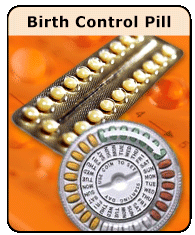Birth Control: The Pill
What Is the Birth Control Pill?
The birth control pill (also called "the Pill") is a daily pill that has hormones to change the way the body works and prevent pregnancy. Hormones are chemicals substances that control the body's cells and organs. In this case, the hormones in the Pill control the ovaries and the uterus.

How Does the Pill Work?
There are two kinds of birth control pills: combination pills and mini-pills.
Most birth control pills are combination pills, which have two hormones: estrogen and progesterone. They help prevent ovulation (the release of an egg during the monthly cycle). For a pregnancy to happen, sperm needs to fertilize (“meet”) an egg.
Mini-pills have just one hormone: progesterone. They sometimes prevent ovulation. But they mostly work by making it tough for sperm to enter the uterus and reach any eggs that were released.
The two kinds of birth control pills also might make it hard for an egg to attach to the wall of the uterus so the egg can’t grow there.
How Are Birth Control Pills Taken?
Combination Pills: Most combination pills come in a 21-day pack or a 28-day pack. Users take 1 hormone pill each day at about the same time for 21 days. Depending on the pack, they'll stop taking the birth control pills for 7 days or take a pill that has no hormones for 7 days. During those 7 days, they'll get a period. Some people like the 28-day pack because it keeps them in the habit of taking a pill each day so they won’t forget.
There’s also a combination pill pack that has hormone pills for 12 weeks and then pills without hormones for 7 days. With this pack, users have periods once every 3 months instead of once a month.
Mini-Pills: Users take a mini-pill every day without a break and might have irregular periods or no periods. The mini-pill doesn’t work as well as combination pills to help prevent pregnancy.
For the first 7 days after someone starts taking the Pill, they should use a second form of birth control, like condoms, to avoid getting pregnant. After 7 days, the Pill should work alone to prevent pregnancy. This timing can vary based on the type of Pill and when they start taking it. Also, it's important to keep using condoms to protect against sexually transmitted diseases (STDs).
All birth control pills work best when the user takes them every day at the same time, even if they're not going to have sex. This is extra important with mini-pills — for them to work, no doses can be missed.
If someone skips or forgets pills, they're not protected against pregnancy and should use a backup form of birth control, like condoms, or stop having sex for a while.
How Well Does the Pill Work?
Over the course of a year, about 8 out of 100 couples who use the Pill to prevent pregnancy will have an accidental pregnancy. The Pill is an effective form of birth control, but even missing 1 day increases the chances of a pregnancy.
In general, how well each kind of birth control method works depends on many things. These include whether a person has any health conditions or is taking any medicines or herbal supplements that might make it less effective. For example, a medicine like an antibiotic can make the Pill not work as well.
Does the Pill Protect Against STDs?
The birth control pill doesn’t protect against STDs. Couples having sex must always use condoms along with the Pill to avoid getting and spreading STDs.
Abstinence (not having sex) is the only method that always prevents pregnancy and STDs.
What Are Possible Side Effects of the Pill?
The Pill is a safe and effective method of birth control. Most users have no side effects or very few.
Side effects that can happen from the Pill include:
- irregular periods (more common with the mini-pill)
- nausea, headaches, dizziness, and breast tenderness
- mood changes
- blood clots (rare in users younger than age 35 who don’t smoke)
Some of these side effects improve over the first 3 months on the Pill. If they’re bothersome or don't get better, a doctor may prescribe a different brand.
The Pill also has some effects that many users enjoy. It can make periods lighter, reduce cramps, and improve acne. Combination birth control pills have also been found to protect against:
- some kinds of breast disease
- anemia
- ovarian cysts (little sacs in the ovaries filled with liquid)
- cancers of the ovaries and endometrium (lining of the uterus)
Who Can Use Birth Control Pills?
Someone who can remember to take a pill each day and wants excellent protection from pregnancy can use birth control pills.
In some cases, medical conditions make the use of the Pill less effective or more risky. For example, it’s not recommended for anyone who has had blood clots, liver problems, or some kinds of migraine headaches.
People with high blood pressure that's under control can sometimes use the Pill if their doctor monitors them. Anyone who has had unexplained vaginal bleeding (bleeding that’s not during their periods) or who might be pregnant should talk with their doctor.
Where Are Birth Control Pills Available?
One kind of mini-pill is available without a doctor’s prescription online and in places like drugstores. Doctors can prescribe other kinds of birth control pills. They’ll ask about the patient's health and family medical history, and do an exam. This might include a pelvic exam. They’ll explain when to begin taking birth control pills and what to do if any are missed.
The doctor might do a blood pressure check a few months later and make sure there are no other problems. After that, people who have sex you should get routine exams every 6 months to a year, or as recommended.
It’s not safe to take someone else's birth control pills.
How Much Do Birth Control Pills Cost?
The Pill usually costs between $0–$50 a month, depending on the type. Many health clinics (like Planned Parenthood) sell birth control pills for less. And birth control pills and doctor visits are covered by many health insurance plans.
